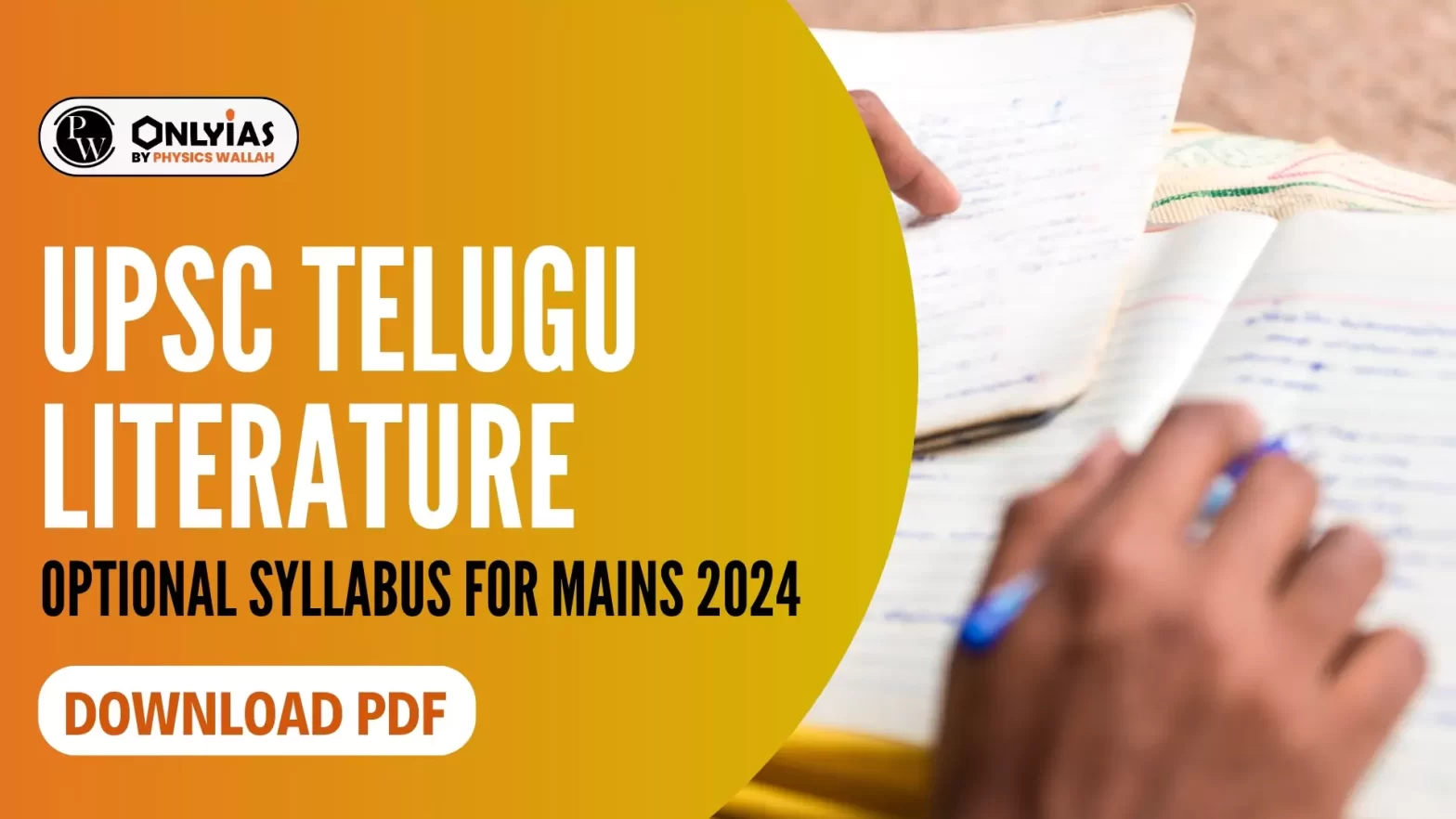![]() Visakha Prashar
Visakha Prashar
![]() September 13, 2023 07:47
September 13, 2023 07:47
![]() 5082
5082
![]() 0
0
Get comprehensive insights into the UPSC Telugu Literature Optional Syllabus for Mains 2024, along with an in-depth analysis of the exam pattern, recommended books, previous year question papers, and preparation strategies & tips.

Telugu Literature Optional is one of the literature optional subjects out of 23 Literature languages in the UPSC list. It is mentioned in the UPSC notification under the literature language optional category “Literature of any one of the following languages.”. It is among the most chosen literature optional subjects.
If candidates have genuine interest in Telugu literature and are familiar with the Telugu language and its cultural context, choosing this subject will make their journey more enjoyable and motivating. In this article, we will try to look closely at Telugu literature from all possible dimensions to help students do well and get high marks in this subject.
The UPSC Telugu Literature Optional Subject covers a comprehensive and rich literary tradition of Telugu language and culture. It covers classical, medieval, and modern Telugu literature, including works by renowned authors across different periods. Candidates study themes, styles, and cultural contexts while also going deep into literary criticism. The syllabus covers a wide range of topics, from ancient epics to contemporary writings, providing a holistic understanding of Telugu language and literature. Telugu has also been designated as a classical language, along with Odia, Sanskrit, Kannada, Tamil, and Malayalam
Overall, this optional subject enables candidates to analyze the diverse literary heritage of Telugu literature.
Like all other optional subjects of UPSC optional subject list, the subject is made up of two papers, Paper I and Paper II, each paper carrying 250 marks. Each paper is divided into two sections. Each paper has a total of eight questions, divided equally into four questions.
Candidates have to attempt any five questions. Question 1 and Question 5 are compulsory. Out of the remaining six, any three have to be attempted, with at least one from each section. Answers must be written in Telugu only.
UPSC Telugu Literature Optional Exam Pattern |
|
| Particular | Details |
| Total Papers | Two papers, Paper I and Paper II |
| Total Marks | 500 (250 Each) |
| Time allowed | 3 Hours for each paper |
| Sections | Section A and Section B |
| Questions | total 8 questions with subparts |
| Compulsory Question | Question Nos. 1 and 5 |
| Marks Distribution | 10, 15, and 20 marker questions |
The UPSC Telugu Literature Optional Syllabus provides a comprehensive overview of Telugu language and literature. It covers classical texts such as the works of Nannaya, Tikkana, and Errana, along with medieval and modern literature by prominent authors like Gurajada Apparao and Sri Sri. Candidates will explore themes, styles, and cultural contexts across different periods, while also engaging with literary criticism. Overall, it offers candidates a deep understanding of Telugu language, literature, and cultural nuances. The syllabus of Telugu literature is divided into two segments, i.e., Paper I and Paper II.
| UPSC Telugu Literature Optional Syllabus | |
| UPSC Mains Telugu Literature Optional Syllabus Papers | Topics |
| UPSC Telugu Literature Syllabus Paper 1 |
|
| UPSC Telugu Literature Syllabus Paper 2 |
|
Paper I of the UPSC Telugu Literature Optional Syllabus focuses on the foundational level of the language and its literature. Paper I syllabus explores the history of Telugu, exploring its place among Indian languages and its connection to the Dravidian family. This paper also studies the evolution of Telugu literature throughout history, including the landmark Sangam period and the development of ethical literature. Paper I touches on recent trends in Telugu studies and the vibrant world of Telugu folk literature, rounding out the understanding of the language’s cultural heritage.
| Section A: Language |
|
| Section B: Literature |
|
UPSC Telugu Literature Optional Syllabus Paper II covers deep exploration of modern Telugu literature and literary criticism. Paper II Syllabus candidates study the works of prominent authors from the 19th century onwards, examining themes, styles, and socio-political contexts. This includes the writings of Gurajada Apparao, Sri Sri, and Viswanatha Satyanarayana, among others, reflecting the diverse literary movements and trends in modern Telugu literature. Paper II provides candidates with a comprehensive understanding of modern Telugu literature and equips them with the critical tools necessary for in-depth analysis and interpretation. Find the detailed syllabus below.
Paper II Syllabus
|
Section A |
|
|
Section B |
|
It is advisable for candidates to choose books wisely from a wide range of options to score good marks in UPSC Telugu literature optional exam in IAS exam. The right books will help them cover all the topics easily and gain a better and more in-depth understanding of the exam sections. To ensure the best preparation, candidates can refer to the Telugu literature books and other subject-specific books mentioned below to score high marks in the exam.
Optional subjects in UPSC are numerous, and each subject has its own domain. and that is why each subject has its own advantages and disadvantages depending on the interest and background of candidates. Still, we try to find out some advantages and disadvantages of Telugu Optional subjects.
| Advantages | Disadvantages |
|
|
UPSC Telugu Optional Question Papers from 2018 to 2022 are readily available for aspirants seeking to enhance their preparation. We provide access to the UPSC Telugu optional question papers in PDF format, an invaluable resource for your preparation.
| UPSC Telugu Optional Previous Year Question Papers | |
| Year | UPSC Telugu Optional Question Papers PDF Link |
| 2023 | PAPER 1 |
| 2022 | Paper 1 |
| 2021 | Paper 1 |
| 2020 | Paper 1 |
| 2019 | Paper 1 |
Getting a good score in the UPSC exam for Telugu literature needs careful planning and doing things step by step. It’s important to get help from different places to do well in the exam. If you’re getting ready for the Telugu literature part of the exam, you can do better by following these steps:
| Name | Year | Rank |
| MS. Gobbilla Vidyadhari | 2020 | 211 |
| Bontha Rahul | 2019 | 272 |
Answer Sheets of the toppers who have given mock tests for Telugu Literature Optional can help candidates get familiar with the writing style and flow of the answer that UPSC demands and can excel in this exam.
Preparing for any optional subject is not enough without planning. If candidates are willing to choose Telugu literature as their optional subject, then they need to have a plan for both general studies and Telugu literature separately. This is because for literature, candidates need to practice writing in the language script. Also, candidates can look at previous successful candidates’ notes and watch their strategy videos to make their own plan for handling the challenges.
| Must Read | |
| NCERT Notes For UPSC | UPSC Daily Current Affairs |
| UPSC Blogs | UPSC Daily Editorials |
| Daily Current Affairs Quiz | Daily Main Answer Writing |
| UPSC Mains Previous Year Papers | UPSC Test Series 2024 |
<div class="new-fform">
</div>

Latest Comments